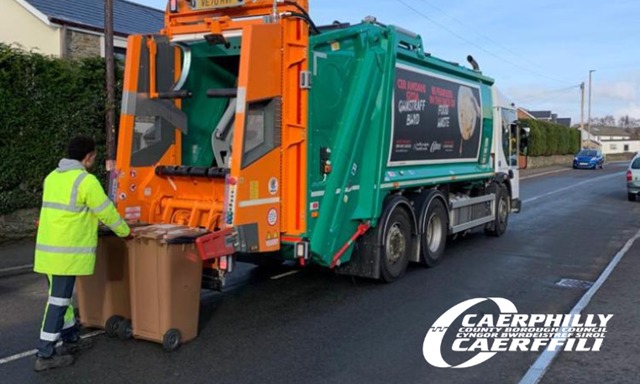THREE- or four-weekly bin collections could be solutions to Caerphilly County Borough’s ailing recycling rates, the council believes.
A new report shows the council may cut collection rounds for non-recyclable waste, which is currently picked up every fortnight.
Residents may also be given new containers for recyclable materials, separating paper, cans and food waste.
The council estimates it will be liable for fines of around £2 million annually if it fails to hit new Welsh Government recycling targets.
Writing in the council’s new draft Waste And Recycling Strategy, Chris Morgan, the cabinet member for waste, said Caerphilly’s performance had “declined” in recent years, meaning there was “a shift required in service delivery and behaviour”.
Last year, Caerphilly recorded a recycling performance of 60.76%, well below the national 64% target and among the worst rates of all Welsh council areas.
That national target is due to rise to 70% this year, leaving the council in a precarious position if it fails to improve on its current performance.
Caerphilly produces “one of the highest levels of residual waste per person in Wales”, Cllr Morgan noted in the draft report.
“Quick wins” introduced in 2023 have had a positive impact, but on their own those measures – such as free food caddy bags, and more education for residents – will leave Caerphilly just short of the 70% target, according to the council report.
The council predicts cutting bin collections to three-weekly or even four-weekly rounds will remove the final obstacle in its way.
Collections of recyclable materials will continue on a more regular basis, even if residual (non-recyclable) waste rounds are cut, and a new sorting policy could come into force.
According to the draft waste strategy, “residents will be provided with separate containers for plastic and cans, glass, and paper and card, which will be collected weekly”.
“Food waste will continue to be collected weekly and garden waste will be collected fortnightly and seasonally”, the report reads.
There would also be weekly collections of hygienic products.
Any new changes to bin collections will only be made after a public consultation, which is likely to open in February.
“It is clear that we cannot make the proposed changes alone and a collective effort is required,” the council said in its report. “It is important that residents, and our communities, have the opportunity to shape proposals.”
Even if the council manages to hit that 70% recycling target and avoid future fines, the implementation of its new waste strategy will cost the local authority an estimated £2.37m over the next two years.
A “significant increase in staff levels” is also likely.



















